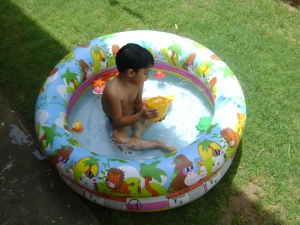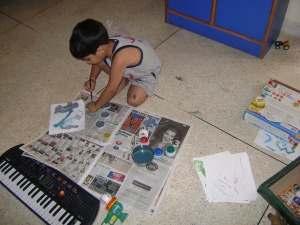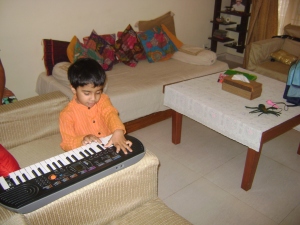And so it begins. The journey of life – for my son as he is about to go to formal school (well, he is currently going to a play school but that’s not the same thing, is it?) And for me – one of the most anxious moments of parenthood as I go about selecting the right school for my son. Well, the second-most anxious moment, come to think of it. The first was when we discovered that my son had elevated thyroids levels at birth and that it could seriously affect his mental health. But thanks to timely detection, it all turned out well in the end. Just as I know this will too. But till it does, it is turning out to be quite a roller-coaster ride!
“It’s all so confusing!” remarked a much-harried friend who is seeking admission to nursery for her daughter as well. As we swapped stories, we tried to make some sense of the madness that was around us. But at the end of the hour-long chat we still had no answers, only more questions. The one that had been nagging me (and quite a few equally harried parents) from the time my son was about two years old: How do you know which is the ‘right’ school for your child? And wait that is not all of it! Even if you did happen to stumble upon the answer, how do you ensure that your child gets admitted into your dream school?
Believe it or not, it is in search for these elusive answers that most parents around me (yes, including me, I’d admit albeit grudgingly) have done things that they would not ordinarily do. But then these are not ordinary circumstances and times like these call for tough (read desperate, if not downright extreme measures!) Foes have become friends, friendship has blossomed where previously there was none, and alliances have been forged (and you thought politics makes strange bedfellows!). They’ve struck up conversations with so-called strangers at parties or even called long-lost friends, friends of friends, relatives of friends’, colleagues, friends and relatives of colleagues, neighbors, and relatives and so on and so forth. They have joined online communities and forums for parents seeking admission to nursery, struck up inane conversations on Facebook, or even taken the boss’ twice-removed cousin out for coffee. All in the hope of getting some much-longed for answers (and also, the kind of questions that are asked at school interviews).
But I digress. I couldn’t help it. Just log on to one of the parent forums and you’ll see the kind of frenzy I am talking about.
Coming back to my question: How do you know which is the right school for your child? (This question may not be applicable for those who had the privilege of studying in some of the finest schools in the country. For them, the story ends right here. Or maybe not.) Funnily enough, it was a question I had asked a family friend (who happens to be a school teacher) out of sheer curiosity sometime back. Her answer was simple: go with your instincts, you’ll know.
Hmm. I got my instincts working overtime when I did the mandatory rounds of schools in the city. The fancy shmancy ones (with the central air-conditioning and color-coordinated potties) I had no patience for. The so-called progressive schools or experiential learning schools seemed too idealistic and were yet to convince me. The ones that had some kind of legacy (and there were just a couple in my city) – the wholesome, no-nonsense, honest-to goodness ones – well, let’s just say it would be easier to get into Fort Knox! And the missionary/convent schools – well, there were none. Nope, not a single one. Where did that leave me? Do I put my son’s life (or least the next 12-13 years of it) in the hands of half a dozen shining, brand new schools that have mushroomed overnight in the millennium city, in the hope that they will make a man out him eventually? Oh wait, that’s my job, isn’t it? Okay, so give him the kind of education that he deserves?
After much thought, (discussions on the dinner table, heated debates and arguments too) we narrowed our choices down to just a couple of schools, two of them not even in the millennium city. And that was the easy part.
The tough part was yet to come. Now that I know which school to send my son how do I assure his admission? With every school following its own system (RTE be damned!) it’s almost like a game of roulette! The only answer I got to this one was from an old friend who refused to join the admission madness for his younger son. (He has just applied to the one school where the older sibling is studying) So exasperated was he with the entire process that he is willing to take a chance this time round. He summed it up for me in one word: sycophancy. Alright, before we put on our moral hats and get all judgmental, let’s just step back and think for a minute. However much we hate to admit it, he may be right.
The question is: why should I, or any parent, have to resort to sycophancy or curry favors or even learn roulette for something as basic as educating my child? Whatever happened to the good old system of just walking into your neighborhood school, meeting the principal and well, just paying up? That’s it. The entire process took a couple of hours, not 3-5 months. That’s how it worked for me, and my sister, and our cousins. For my hubby too. Or maybe that’s how it’s always been played; all I need to do is learn the rules of the game.
While you are figuring this one out it’s time for me to go roll the dice! Jokes apart, some thoughts on this would be welcome. I am curious to know – from parents who have already walked down this road, and those who have yet to: just how do you do it?


